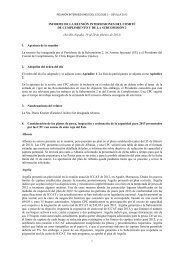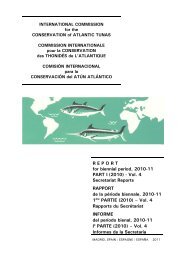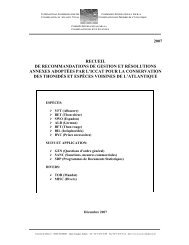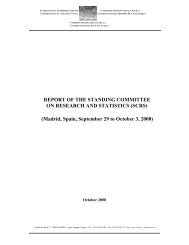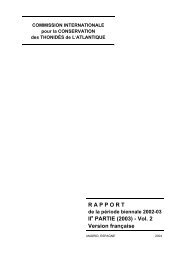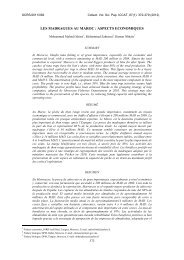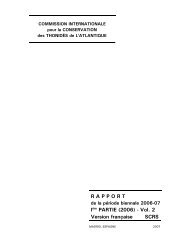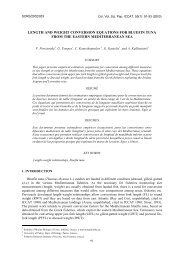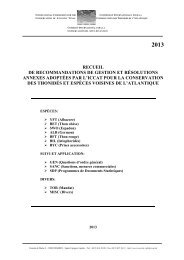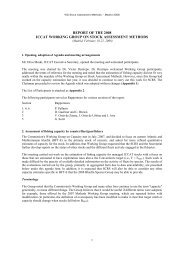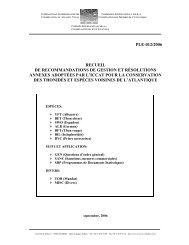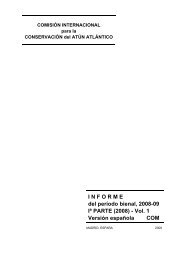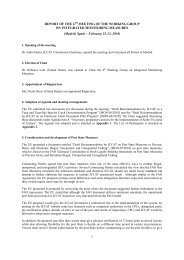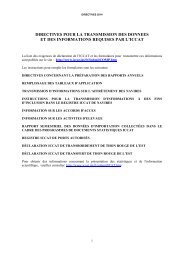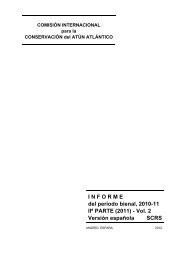E - Iccat
E - Iccat
E - Iccat
Create successful ePaper yourself
Turn your PDF publications into a flip-book with our unique Google optimized e-Paper software.
PANEL APPENDICES<br />
3. Provide for the obligation of tuna farms to record size at harvest of all individual fish and to submit the<br />
information to ICCAT SCRS for stock assessment purposes.<br />
According to SCRS, the lack of reliable size data on purse seine catches strongly affect the performance of the<br />
current stock assessment as it is a source of large errors and related uncertainties on stock assessment results.<br />
WWF calls on ICCAT CPCs to provide for the obligation of farms to routinely sample for weight and length<br />
every fish at harvest and to submit this information along with that on catch date, gear type, flag of catching<br />
vessel/trap and area of capture to the SCRS. WWF also calls ICCAT CPCs to make it mandatory for farms to<br />
submit complete information on length and weight of individual fish prior to caging based on stereoscopic and/or<br />
acoustic methodologies. Besides, ICCAT SCRS warns this year that “it is difficult to derive any clearer<br />
conclusion without more precise scientific information about the catch composition, effort and spatial<br />
distribution of the main Mediterranean fisheries”. With respect to the later point WWF calls on ICCAT to ensure<br />
up to date disaggregated VMS and BCD data is fully and timely made available to ICCAT SCRS for scientific<br />
purposes.<br />
4. Support the use of international trade data in scientific analyses and compliance assessments.<br />
ICCAT SCRS warns that “since the late 1990s size samples cannot be obtained from Mediterranean purse<br />
seiners due to farming”. This major data limitation seriously undermines the reliability of any stock assessment<br />
on the stock. WWF calls on ICCAT CPCs to submit ICCAT SCRS the most precise information available on<br />
Atlantic bluefin tuna trade fluxes to enable ICCAT scientists elaborating on this data to infer the catch<br />
composition data missing for the last years. Besides, and as shown by several studies presented to ICCAT along<br />
the last years, trade data allow for assessing IUU catches. WWF also calls on ICCAT CPCs to mandate the<br />
ICCAT Committee on Compliance (COC) to formally assess compliance with the TACs based on these data.<br />
5. Fully support ICCAT Atlantic Wide Research Program for Bluefin Tuna (GBYP) and SCRS to recover data<br />
and to develop new methods leading to a much more reliable stock assessment in 2015.<br />
WWF calls on ICCAT CPCs to endow GBYP data recovery programme with the necessary means to contribute,<br />
as a matter of urgency, fisheries-independent indicators on stock status. Similarly, WWF calls for the maximum<br />
support to SCRS to develop a new stock assessment methodology that takes unquantified uncertaintities into<br />
account, on time for the next assessment scheduled in 2015. ICCAT SCRS is clear three years are crucially<br />
needed to go from now to the next stock assessment, to ensure a much better picture on the status of the stock is<br />
obtained. WWF calls on ICCAT CPCs to fully respect the advice from the SCRS at this regard for the sake of<br />
the quality of future management measures.<br />
WWF also supports the swift implementation of the electronic Bluefin Tuna Catch Document (BCD) programme<br />
as well as the strengthening of controls and compliance in the fishery. At this later regard, WWF notes with<br />
strong concern the relaxation of the attention devoted to compliance issues by ICCAT the last year, including the<br />
elimination of the inter-sessional COC meeting prior to the start of the East Atlantic bluefin tuna fishing season<br />
and of the COC two-day annual meeting traditionally scheduled at the start of the annual ICCAT Meeting.<br />
The strong commitment by ICCAT CPCs to fight IUU has been one of the main pillars behind the incipient<br />
recovery of the stock. Any relaxation on this matter would risk of taking this fishery back to the dark ages and to<br />
destroy the achievements of years of productive collective work.<br />
WWF’s vision for the East Atlantic and Mediterranean bluefin tuna fishery is that of a stock sustainably<br />
managed to the benefit of the marine ecosystems, fisheries communities and consumers. Today we might be<br />
closer for this, something that would have seemed unthinkable only a few years ago. WWF calls on the<br />
responsibility of both ICCAT CPCs and the fishing industry to build on this momentum and keep recovery<br />
ambitions high.<br />
Big achievements are long in the making but in only an instant can be lost.<br />
Reference<br />
Tudela, S. and Quílez-Badia, 2012, Reassessing fleet-specific catch rates in the East Atlantic and Mediterranean<br />
bluefin tuna fishery. Collect. Vol. Sci. Pap., 68(1): 140-150.<br />
263



